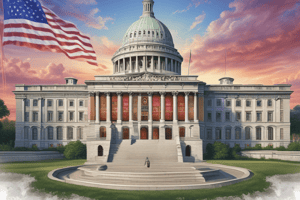Podcast
Questions and Answers
भारतातील संविधान कसा आहे?
भारतातील संविधान कसा आहे?
- महाभागाचा आधार (correct)
- महिलांच्या अधिकारांवर आधारित
- संसदीय प्रणालीवर आधारित
- एकूण सत्ता एकत्रित करणारा
कोकणस्थित देश आणि प्रदेशीय सरकारींसह सत्ता सामायिक करतात?
कोकणस्थित देश आणि प्रदेशीय सरकारींसह सत्ता सामायिक करतात?
- महाभागी प्रतिपुरक
- ताज्या निवेदनांमुळे
- संघी महासंघ केलेले
- संकीर्ण प्रदेशप्रमुख साथी (correct)
कनेडा, फ्रांस, जर्मनी, ऑस्ट्रेलिया हे कोकणस्थित देश कोणते?
कनेडा, फ्रांस, जर्मनी, ऑस्ट्रेलिया हे कोकणस्थित देश कोणते?
- प्रमुख प्रतिष्ठा
- प्रतिकूलता प्रतिष्ठा
- समेकनलेला संस्थान (correct)
- पूर्णप्रमुख/पूर्णप्रमुख
'संघी महासंह' म्हणून प्रसिद्ध करण्यात आलेले कोकणस्थित देश कोणते आहे?
'संघी महासंह' म्हणून प्रसिद्ध करण्यात आलेले कोकणस्थित देश कोणते आहे?
'महिलांना समर्पित' हे महत्त्वपूर्ण केस है?
'महिलांना समर्पित' हे महत्त्वपूर्ण केस है?
संविधानाच्या काय कामे आहेत?
संविधानाच्या काय कामे आहेत?
संविधान कुठल्या कामांसाठी प्रमुखपणे सुनिश्चित करतो?
संविधान कुठल्या कामांसाठी प्रमुखपणे सुनिश्चित करतो?
संविधान कोणत्या प्रमुख हक्क आणि स्वतंत्रता सुनिश्चित करतं?
संविधान कोणत्या प्रमुख हक्क आणि स्वतंत्रता सुनिश्चित करतं?
Study Notes
Understanding Polity: A Focus on Constitutions
In this exploration of polity, we'll delve into the concept of constitutions — foundational documents that define how societies operate and govern themselves. A polity is simply another term used to describe a community governed by laws and institutions; it encompasses all aspects related to its structure, decision-making processes, citizen rights, and responsibilities. In essence, when discussing polities, our attention often turns to their respective constitutions because these texts establish the rules that shape political behavior and interactions within society.
A constitution serves several key functions:
- It outlines the fundamental principles, values, and objectives of the government and society
- It defines the powers, duties, and structures of governmental branches and agencies
- It guarantees certain basic human rights and freedoms of citizens
- It ensures checks and balances to prevent any one branch from becoming too powerful
- It provides for amendment procedures so that the document can evolve with changing societal needs
- It establishes dispute resolution mechanisms like courts and tribunals
Constitutional systems vary widely across countries due to factors such as historical backgrounds, cultural traditions, economic demands, and aspirations for political stability and progress. For instance, in some nations, the legislature makes up the bulk of constitutional power, while others may have separate written or unwritten sources of law that influence policymaking. Some countries follow federal systems where power is shared between national and regional governments, whereas others prefer unitary forms of government with more centralized authority.
The U.S. Constitution is highly regarded globally because of its success in establishing a stable, democratic nation with robust protections for individual liberties. This document was drafted through compromise among delegates representing different regions, social classes, and ideological perspectives. Since its adoption in 1789, the American Constitution has undergone numerous amendments, reflecting the evolution of our country's beliefs, norms, and practices over time.
Other notable examples of influential constitutions include those of Canada, France, Germany, Australia, Japan, Brazil, South Africa, Switzerland, and Kenya. Each of these nations represents unique variations on themes like federalism, parliamentarism, semi-presidentialism, bicameral vs. unicameral legislatures, direct democracy, and proportional representation. These differences illustrate the incredible variety in constitutional design and help us understand why certain polities function better than others for specific contexts.
Political scientists and legal scholars scrutinize constitutions constantly for strengths, weaknesses, anomalies, and potential improvements based on empirical evidence, comparative evaluations, and theoretical insights. As world populations grow and face new challenges, scholars will continue to explore ways to improve existing constitutions and develop innovative frameworks to bolster peace, justice, equality, and prosperity for people around the globe.
Studying That Suits You
Use AI to generate personalized quizzes and flashcards to suit your learning preferences.
Description
Explore the significance of constitutions in shaping societies and governments, understand the key functions of a constitution, and learn about the diverse constitutional systems across nations. Discover influential constitutions like those of the U.S., Canada, France, and more, and gain insights into the evolution and impact of constitutional design on political structures and governance.




